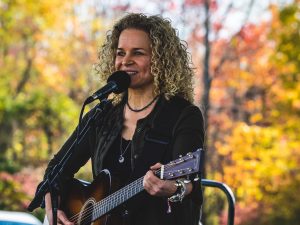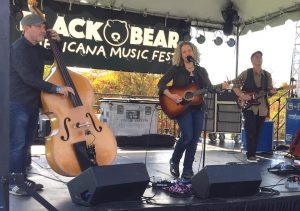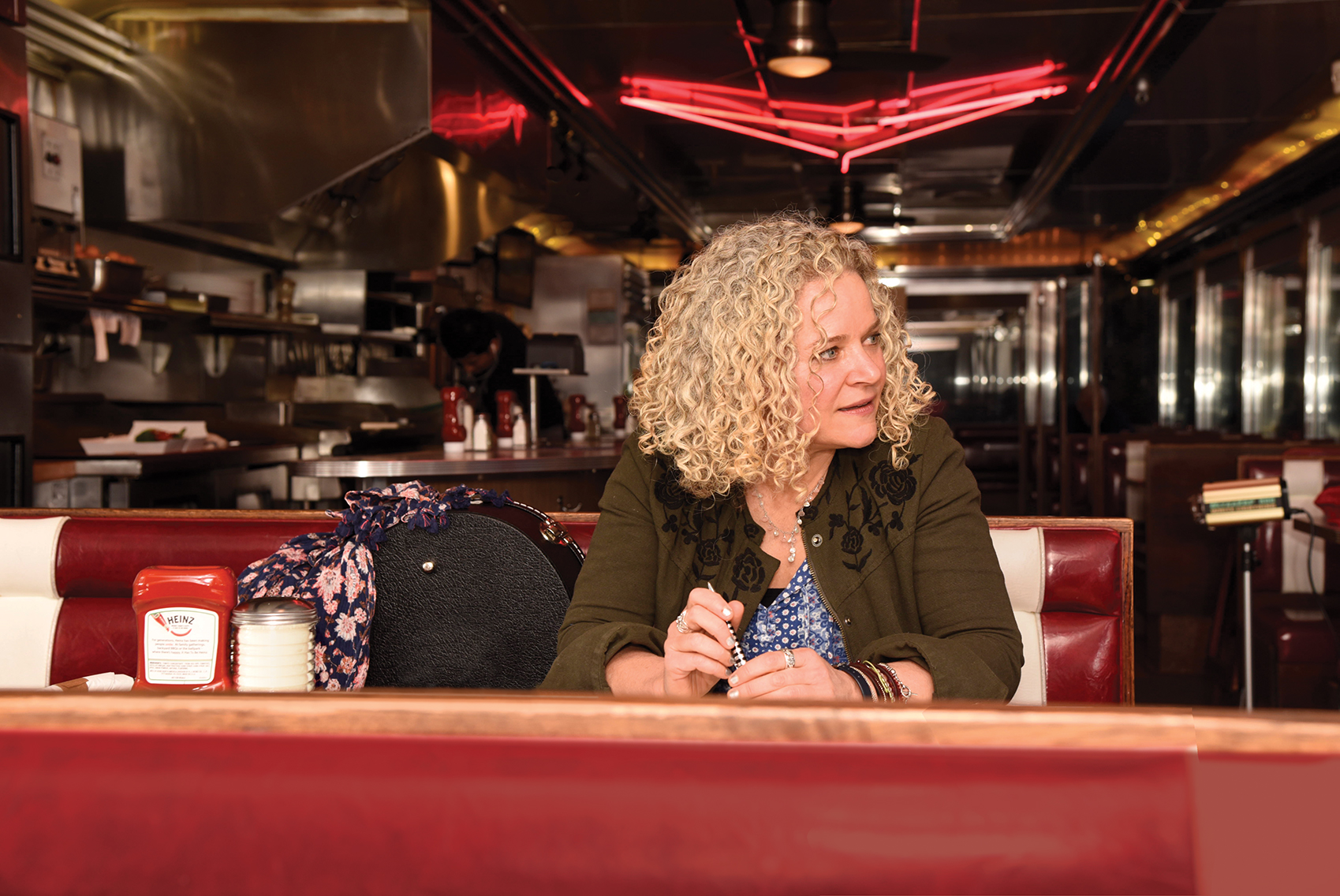Twenty years ago, when I was working on my master’s degree in journalism, I needed to find an interesting subject to write a feature profile about for a class assignment. Since I was also writing for several publications, including the Connecticut weekly section of The New York Times, I sometimes used my freelance stories to fulfill class assignments.
While working on a Times feature about a new performance venue in Bridgeport called The Acoustic Café (which has sadly closed since then), I was introduced to Lara Herscovitch ’95 MSW, program director at the Greater Bridgeport Area Foundation, who also performed music on weekends, including at the Café. At the time, she was in the process of recording “Sin Tierra,” her first album of original, Latin-flavored contemporary folk music, which was released on LaRama Records, the label she started for her music. After some conversations, she agreed to be the subject of my writing assignment.
Over the next several weeks, I had long conversations with Herscovitch about her music, passion for helping people and the possibility of pursing music full-time in the future. I spoke with musicians she recorded with and others who knew her. I wrote my story for the class and then used an abbreviated profile on Herscovitch as a sidebar story to the feature I wrote on The Acoustic Café published in the Times on Nov. 1, 2001.

Over the next two decades, she continued to spend her days evaluating a nonprofit program, writing a grant, or testifying before a legislative committee. At night or on the weekends, she would head to a recording studio, an open mic night, or a scheduled performance while creating and releasing five more albums. As part of my avocation of hosting a music program on community radio stations in Connecticut, including WHUS, since 1996, we discussed her latest recordings both on and off the air over those 20 years.
With each new recording, she expanded her performances beyond Connecticut, receiving favorable reviews for her music and stage presence. The Boston Globe said she brings “a luminous voice and a buoyant stage presence… big-hearted lyrics embrace the sum of life… Herscovitch’s music blows on the embers of a lagging spirit or a dormant creative life.” In 2009, she was named Connecticut’s State Troubadour –an ambassador of music and song who promotes cultural literacy– and gained national attention that year during an appearance on American Public Media’s “A Prairie Home Companion,” when the program was broadcast nationally from the Palace Theater in Waterbury.
Herscovitch recently completed her seventh recording, titled “Highway Philosophers,” and the first since becoming a full-time musician three years ago, realizing a goal she articulated when we first met.
”I would love to have the opportunity to do music full time, to see how that is,” she told me in 2001. ”But maybe because I have to do both I believe that my day job feeds my music. Doing social work and working with the high caliber of people that I do in the arts, in education, in health and human services and in the environment is so incredible. They’re such good people. Working with them feeds me as a person. I like to believe that any artist is a better artist if they are balanced as an individual. I may be believing that out of necessity right now, but I’d love the opportunity to test my theory.”
Now in her third year as a full-time performer, and despite the time-out all performers are experiencing due to the COVID-19 pandemic, Herscovitch answers the question of how things are going with optimism.
“Well, right now is a very confusing time, but overall it’s great. I am a musician at my core, and it took me a long time to get here. It’s been really rewarding to have more time to focus on it all. Any artist, I think, generally wants more time for their art,” she says. “I still live by that Ray Charles quote, ‘I never wanted to be famous, I only wanted to be great.’ I want to honor music and give back to what it has given me; honor it enough to just focus on growing, so I can do a better job. Now we’re in this strange new world and I’m doing most concerts online; it’s a little scary to ponder the lost income, but I’m an optimist at heart. I’m hopeful we’ll all find a way. The pandemic has helped me understand the importance of music and art in general. When I was working full-time in the public policy world, I felt like that was important work; if I’m being honest, I felt like it was more important than music. Now I really see and feel how they’re both important, just in very different ways.”
It has been a long journey, literally a global one. After completing her master’s degree in policy at the School of Social Work, Herscovitch traveled around the world as an education specialist for Save the Children, the humanitarian organization for children based in Fairfield. During six years working from the U.S. and on several continents, she carried her guitar as a traveling companion, singing and writing songs. She was preparing to pursue a doctoral degree in social policy until a friend invited her to perform with him in New York City. As she told me in 2001, “Every single light bulb in my heart and soul went off. It wasn’t even a choice. I knew I had to do this.”

From the Greater Bridgeport Area Foundation she moved to Save the Sound, reducing her “full-time” from five days a week to four, to leave more time for music; then the Connecticut Juvenile Justice Alliance for the next nine years, focused on keeping children out of the juvenile and criminal justice systems.
In 2012, while at the Alliance, she completed the Community Leadership Program in New Haven, around the time she was finishing her album titled “Four Wise Monkeys,” a conceptual album that addresses themes of mass incarceration and the prison industrial complex, including her interpretation of the Johnny Cash classic, “Folsom Prison Blues.” The recording includes a quote on the album sleeve from The Rev. Martin Luther King, Jr.: “We must move past indecision to action… Now let us begin. Now let us re-dedicate ourselves to the long and bitter, but beautiful, struggle for a new world.”
Herscovitch says going through the Community Leadership Program helped her to understand that she could still pursue her music and stay connected to social justice. She continues her association with the program as creative director and editor of its blog.
“I don’t think that’s ever going to change. I am one of the protesters, showing up in support of Black Lives Matter,” Herscovitch says. “I think it’s important for all of us to take this very late opportunity to evolve and to make this country healthier, increase equity and justice. It’s ridiculously overdue – 400 years overdue. I’m trying to show up let my music also be of service. Some of it’s always going to be personal. Some of it’s going to be aspirational. And some of it is probably always going to be social justice because I care about the world.”
She describes “Highway Philosophers” as “an album of adventure, authenticity, courage and freedom,” including one song about escaping a circus, another about sailing to Newfoundland as metaphor for becoming who we are – in her case, the moment when she had the courage to go into music full-time.
“I think this is an album of the hero’s journey and all the different elements of it,” Herscovitch says. “Some of that is the past and healing, the very personal, and some of that is to fire up a hot air balloon and get out of the circus with the tiger because the ringmaster is unkind and we need to do things a different way. I always hope to inspire people to lean into their best self in the same way that I’m trying to lean into my best self. This is the first album, with no disrespect to any of the ones that came before it, that I just feel so thoroughly proud of. This time if a song felt good enough, I knew it wasn’t done. And I had more time to get it right. It took a long time to do and it was a painstaking process in the studio. Which also can be really fun. I feel at peace. If I got hit by the proverbial bus, I will feel content that I was able to release this album before I went.”



